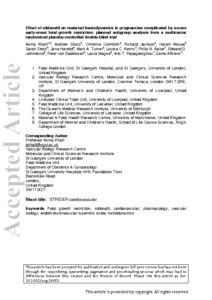Khalil, A;
Sharp, A;
Cornforth, C;
Jackson, R;
Mousa, H;
Stock, S;
Harrold, J;
Turner, MA;
Kenny, LC;
Baker, PN;
et al.
Khalil, A; Sharp, A; Cornforth, C; Jackson, R; Mousa, H; Stock, S; Harrold, J; Turner, MA; Kenny, LC; Baker, PN; Johnstone, ED; von Dadelszen, P; Magee, L; Papageorghiou, AT; Alfirevic, Z
(2020)
Effect of sildenafil on maternal hemodynamics in pregnancies complicated by severe early‐onset fetal growth restriction: planned subgroup analysis from a multicenter randomized placebo‐controlled double‐blind trial.
Ultrasound Obstet Gynecol, 55 (2).
pp. 198-209.
ISSN 1469-0705
https://doi.org/10.1002/uog.20851
SGUL Authors: Khalil, Asma
![[img]](https://openaccess.sgul.ac.uk/111140/1.hassmallThumbnailVersion/Khalil_et_al-2019-Ultrasound_in_Obstetrics_%26_Gynecology.pdf)  Preview |
|
PDF
Accepted Version
Available under License ["licenses_description_publisher" not defined].
Download (2MB)
| Preview
|
Abstract
Objectives
Fetal growth restriction (FGR) is associated with maternal cardiovascular changes. Sildenafil, a phosphodiesterase type‐5 inhibitor, potentiates the actions of nitric oxide, and it has been suggested that it alters maternal hemodynamics, potentially improving placental perfusion. Recently, the Dutch STRIDER trial was stopped prematurely owing to excess neonatal mortality secondary to pulmonary hypertension. The main aim of this study was to investigate the effect of sildenafil on maternal hemodynamics in pregnancies with severe early‐onset FGR.
Methods
This was a cardiovascular substudy within a UK multicenter, placebo‐controlled trial, in which 135 women with a singleton pregnancy and severe early‐onset FGR (defined as a combination of estimated fetal weight or abdominal circumference below the 10th centile and absent/reversed end‐diastolic flow in the umbilical artery on Doppler velocimetry, diagnosed between 22 + 0 and 29 + 6 weeks' gestation) were assigned randomly to receive either 25 mg sildenafil three times daily or placebo until 32 + 0 weeks' gestation or delivery. Maternal blood pressure (BP), heart rate (HR), augmentation index, pulse wave velocity (PWV), cardiac output, stroke volume (SV) and total peripheral resistance were recorded before randomization, 1–2 h and 48–72 h post‐randomization, and 24–48 h postnatally. For continuous data, analysis was performed using repeated measures ANOVA methods including terms for timepoint, treatment allocation and their interaction.
Results
Included were 134 women assigned randomly to sildenafil (n = 69) or placebo (n = 65) who had maternal BP and HR recorded at baseline. At 1–2 h post‐randomization, compared with baseline values, sildenafil increased maternal HR by 4 bpm more than did placebo (mean difference, 5.00 bpm (95% CI, 1.00–12.00 bpm) vs 1.25 bpm (95% CI, –5.38 to 7.88 bpm); P = 0.004) and reduced systolic BP by 1 mmHg more (mean difference, –4.13 mmHg (95% CI, –9.94 to 1.44 mmHg) vs –2.75 mmHg (95% CI, –7.50 to 5.25 mmHg); P = 0.048). Even after adjusting for maternal mean arterial pressure, sildenafil reduced aortic PWV by 0.60 m/s more than did placebo (mean difference, –0.90 m/s (95% CI, –1.31 to –0.51 m/s) vs –0.26 m/s (95% CI, –0.75 to 0.59 m/s); P = 0.001). Sildenafil was associated with a non‐significantly greater decrease in SV index after 1–2 h post‐randomization than was placebo (mean difference, –5.50 mL/m2 (95% CI, –11.00 to –0.50 mL/m2) vs 0.00 mL/m2 (95% CI, –5.00 to 4.00 mL/m2); P = 0.056).
Conclusions
Sildenafil in a dose of 25 mg three times daily increases HR, reduces BP and reduces arterial stiffness in pregnancies complicated by severe early‐onset FGR. These changes are short term, modest and consistent with the anticipated vasodilatory effect. They have no short‐ or long‐term clinical impact on the mother.
| Item Type: |
Article
|
| Additional Information: |
This is the peer reviewed version of the following article: Khalil, A., Sharp, A., Cornforth, C., Jackson, R., Mousa, H., Stock, S., Harrold, J., Turner, M.A., Kenny, L.C., Baker, P.N., Johnstone, E.D., Von Dadelszen, P., Magee, L., Papageorghiou, A.T. and Alfirevic, Z. (2020), Effect of sildenafil on maternal hemodynamics in pregnancies complicated by severe early‐onset fetal growth restriction: planned subgroup analysis from a multicenter randomized placebo‐controlled double‐blind trial. Ultrasound Obstet Gynecol, 55: 198-209, which has been published in final form at https://doi.org/10.1002/uog.20851. This article may be used for non-commercial purposes in accordance with Wiley Terms and Conditions for Use of Self-Archived Versions. |
| Keywords: |
Fetal growth restriction, sildenafil, cardiovascular, endothelium/vascular type/nitric oxide, hemodynamics, pharmacology, vascular biology, 1114 Paediatrics And Reproductive Medicine, Obstetrics & Reproductive Medicine |
| SGUL Research Institute / Research Centre: |
Academic Structure > Molecular and Clinical Sciences Research Institute (MCS) |
| Journal or Publication Title: |
Ultrasound Obstet Gynecol |
| ISSN: |
1469-0705 |
| Language: |
eng |
| Dates: |
| Date | Event |
|---|
| 3 February 2020 | Published | | 20 August 2019 | Published Online | | 9 August 2019 | Accepted |
|
| Publisher License: |
Publisher's own licence |
| Projects: |
|
| PubMed ID: |
31432556 |
 |
Go to PubMed abstract |
| URI: |
https://openaccess.sgul.ac.uk/id/eprint/111140 |
| Publisher's version: |
https://doi.org/10.1002/uog.20851 |
Statistics
Item downloaded times since 03 Sep 2019.
Actions (login required)
 |
Edit Item |



